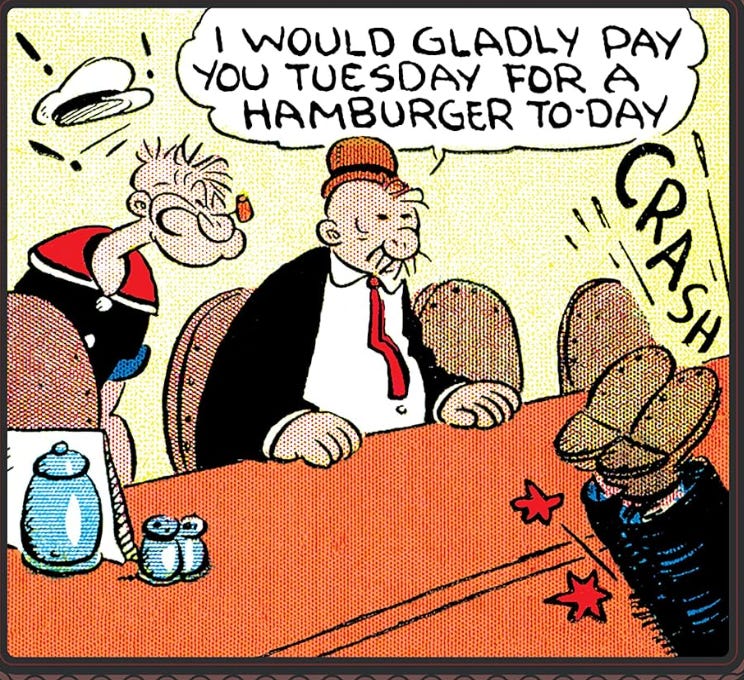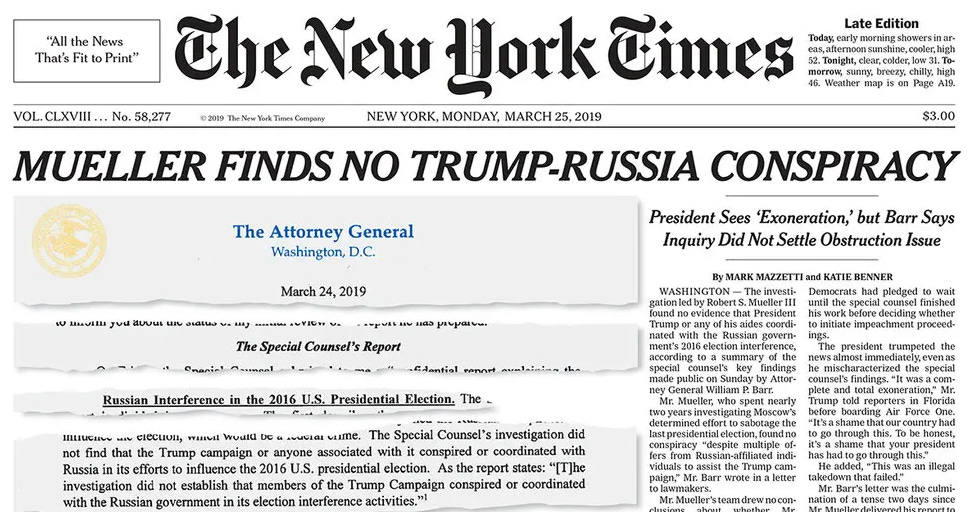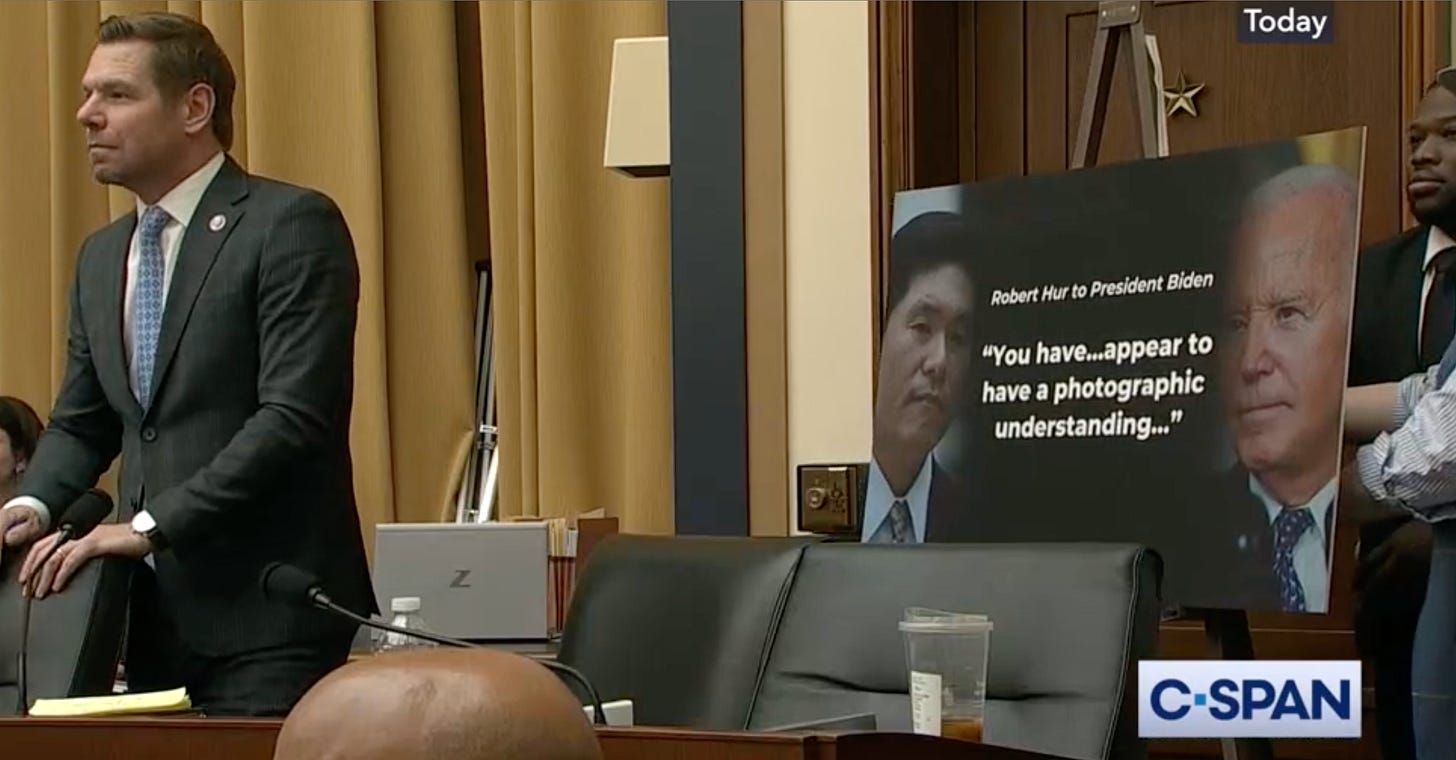Election Countdown, 228 Days to Go: Today's Characters Make Their Mark on History.
Matchups from America's past for Robert Hur, Chuck Schumer, Donald Trump, and more.
The always-cadging figure Wimpy, from the classic cartoon series Popeye by E.C. Segal. (Library of Congress.)
Several figures in this year’s politics have changed in position or reputation over the two weeks since Joe Biden’s State of the Union address. Here are the historical compare-and-contrasts.
1) Is Robert Hur like Kenneth Starr? Or like Bill Barr?
Yes. And yes.
Here’s the baseline for these likenesses:
—The late Kenneth Starr, whose career ended in humiliation (with his removal as president of Baylor over how the school handled rape allegations about its athletes), was the zealot prosecutor who parlayed the minor “Whitewater” real-estate scandal into an impeachment case against Bill Clinton. For the record, one of Starr’s gung-ho lieutenants in that cause was the young Brett Kavanaugh.1
—William Barr, now a Trump critic, played a crucial role in the Trump years as the man who laundered the “Mueller Report.” As Attorney General, Barr delayed release of the full report, publicized only cherry-picked selections that minimized Trump’s wrong-doing, and fed reporters for many weeks of initial press coverage like what you see below:
The picture Barr presented was phony, and it’s not me saying that. A year after these selective releases a federal judge appointed by GW Bush concluded that Barr’s versions had been “distorted” and “misleading,” as part of “a calculated attempt to influence public discourse about the Mueller report in favor of President Trump.”
—Robert Hur’s name now joins Starr’s and Barr’s as shorthand for a politicized prosecutor who knew how to “work the refs” with the press.
The full Mueller findings, replete with damaging details about Russian efforts to elect Trump2, never caught up with Barr’s cynical whitewash. And Robert Hur? For nearly five weeks he dominated the news with his “elderly man with a poor memory” line about Joe Biden.
That began on February 8, when Hur released a report in full awareness that the gratuitous “poor memory” line would drown out the report’s supposed main conclusion, clearing Biden of any criminal charges.3 What he knew would happen, did. A sample of the next month of coverage4 in the major press, first the WaPo and then the NYT:
The beginning of the end for Hur’s version came on March 7, when Biden delivered a vigorous and non-addled-seeming State of the Union address. The real blow came five days later, on March 12, when Hur released transcripts of his multi-hour interviews with Biden. (It’s worth remembering that these interviews started the very day after the Hamas massacre of October 7, when Biden had a lot else going on.)
Hur put out these transcripts only hours before his appearance before a House Subcommittee. But that was enough time for Democrats on the committee to find some of the most egregious illustrations of Hur’s thumb on the scale. You can see on this C-Span clip how Rep. Eric Swalwell refreshes Hur’s memory about his having said to Biden, in the interview, that he [Biden] appeared to have “photographic” recall and understanding.
Did Hur include that in his report, Swalwell asks? Deadpan and mealy mouthed, Hur says “that word [photographic] does not appear in my report.” But “elderly” and “poor memory” do. Starr and Barr say: Welcome aboard!
2) Is Chuck Schumer Like William Fulbright?
OK, it’s a stretch:
—In the 1920s J. William Fulbright was a star halfback on the University of Arkansas Arizona [arrggh] football team, and president of the student body, before becoming a Rhodes scholar and then beginning five terms in the Senate at age 39. He chaired the Senate Foreign Relations committee from 1959 to 1974, the Vietnam years.
—In the 1960s Chuck Schumer, who had been a good high school basketball player in Brooklyn, did not make the team at Harvard and turned his attention to politics instead. He entered Congress at age 30, became a senator at age 48, and is now majority leader in his fifth term.
But here’s a similarity: I think Schumer’s speech last week about the US and Israel merits at least some comparison with Fulbright’s dissents about the Vietnam war from the mid-60s onward. Again an obvious difference: Fulbright’s critiques on Vietnam were a multi-year process and represented a head-on challenge to his own party’s president, LBJ. Schumer’s speech was a stand-alone event, apparently in sync with his party’s president.
But Fulbright is known to history for the daring and principle of his stand. I think an important part of Schumer’s legacy will be his willingness to say about Netanyahu, enough.
You can see the whole speech on video at C-Span, and see the main text here. Schumer’s argument boiled down to (quoting his speech):
Right now, there are four major obstacles standing in the way of two states, and until they are removed from the equation, there will never be peace in Israel and Gaza and the West Bank
Those four major obstacles are:
Hamas, and the Palestinians who support and tolerate their evil ways.
Radical right-wing Israelis in government and society.
Palestinian Authority President Mahmoud Abbas.
Israeli Prime Minister Benjamin Netanyahu.
Here’s another parallel to think of. When John McCain first was elected to the House of Representatives, in 1982, not even ten years had passed since his release from imprisonment and torture in North Vietnam. But one of his first projects was working for reconciliation among Americans who had been for and against the Vietnam War, and between the US and Vietnam.
-No one could question John McCain’s credibility on these issues. I first met him in those years and never forgot his decision to use his personal authority this way.
-No one can question Chuck Schumer’s commitment to the long-term interests of Israel and to the US-Israel connection. He is of course also the senior Jewish elected official in the US government. I respect his decision to use his personal authority this way. It is vanishingly rare to see prominent legislators taking potentially risky stands of principle. Think of: Lindsey Graham, Tim Scott, Mitch McConnell. Here is a counter example worth remembering.
3) Is Joe Biden like Harry Truman?
Keep reading with a 7-day free trial
Subscribe to Breaking the News to keep reading this post and get 7 days of free access to the full post archives.






